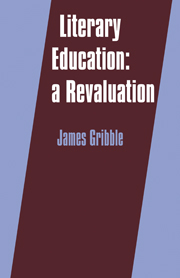Book contents
- Frontmatter
- Contents
- Acknowledgements
- Introduction Literature, life and education: some problems about how they relate to one another
- 1 Literature and truth
- 2 Literary criticism and literary education
- 3 Objectivity and subjectivity in literary education
- 4 The subordination of criticism to theory: structuralism and deconstructionism
- 5 Literature and the education of the emotions
- 6 Empathy and literary education
- 7 Literary intention and literary education
- 8 Literature, morality and censorship
- Notes
- Index
Introduction Literature, life and education: some problems about how they relate to one another
Published online by Cambridge University Press: 01 June 2011
- Frontmatter
- Contents
- Acknowledgements
- Introduction Literature, life and education: some problems about how they relate to one another
- 1 Literature and truth
- 2 Literary criticism and literary education
- 3 Objectivity and subjectivity in literary education
- 4 The subordination of criticism to theory: structuralism and deconstructionism
- 5 Literature and the education of the emotions
- 6 Empathy and literary education
- 7 Literary intention and literary education
- 8 Literature, morality and censorship
- Notes
- Index
Summary
It is often assumed that if you assert with sufficient assurance and resonance that literature transforms our moral lives, or opens up worlds of vicarious experience through empathy, or leads to new vistas of knowledge and understanding of ourselves and other people, or educates our emotions, then that is all that is required. When a philosopher imprudently asks what all this means, or how it is known, he is likely to be met with hostility to such ‘abstract’ discussions of literary studies.
It must be admitted that there is some foundation for the widespread conviction, especially among university teachers of English, that philosophers lack genuine understanding of literary studies. Those philosophers who have taken an interest in literature are, typically, aestheticians, whose apparent lack of literary education is reflected in their failure to attend to literary works in an appreciative and discriminating manner. Very little philosophical work has appeared which exhibits an adequate understanding of literary criticism and scholarship.
A notable example of such work is John Casey's book The Language of Criticism. It is not surprising that this has been out of print for a number of years. The hostility felt by literary academics towards such an enterprise by a philosopher is summed up in the reaction of one distinguished English teacher who refused to go further than the title, saying with great disdain, ‘The language of criticism, indeed!’
- Type
- Chapter
- Information
- Literary EducationA Revaluation, pp. 1 - 6Publisher: Cambridge University PressPrint publication year: 1983

